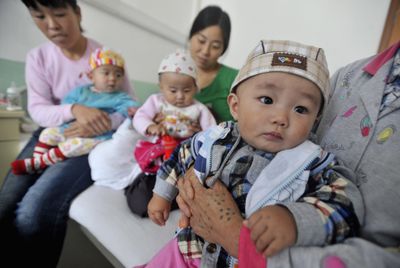Chinese company recalls baby formula
Infant dies, at least 50 suffer kidney stones

BEIJING – Like most parents, Dong Zhenqing and his wife wanted only the best for their infant son. So they fed him Sanlu’s Bei Bei infant formula, a famous Chinese brand with impressive health claims and top celebrity endorsements.
When he was only 4 months old, however, little Tianyu developed a high fever, swollen stomach and urinary problems. He was diagnosed with kidney stones and borderline renal failure.
The couple initially suspected his drinking water then, on meeting other parents in similar straits, zeroed in on his infant formula.
Sanlu, China’s largest milk powder maker, recalled 700 tons of formula Friday, according to the China Daily newspaper, after one infant died and more than 50 babies suffered kidney stones. The government also promised an investigation and vowed that those responsible would face “serious punishment.”
The health problems have been blamed on melamine, which is used to make plastic and to tan leather. It is not supposed to be ingested, but sometimes it has been used by Chinese companies to make food appear protein-rich. The chemical also was involved in a massive pet food recall last year after dogs and cats in the U.S. died or fell ill.
Regulators say none of the milk powder was exported to the U.S., at least legally, although the Food and Drug Administration is concerned that some of it might be available domestically in Asian and ethnic markets.
Although tainted exports get the most attention, domestic Chinese consumers often suffer the most from contaminated products, and this latest incident helps illustrate the lack of trust many Chinese feel in authority. It follows repeated vows by China to improve food and product safety standards after a string of scandals last year that, besides pet food, involved toys, toothpaste, seafood and medicine. China’s regulatory system is characterized by corruption, inadequate staffing and inefficiency, and as a result consumer protection often falls short.
“People need to be told so innocent children can be saved from this milk powder,” said Tianyu’s 34-year-old mother, who identified herself only by her surname, Chen, so people in her village wouldn’t call.
But Internet comments bemoaned the pain caused to some of society’s most vulnerable.
“To support a local brand, I always bought Sanlu milk powder even though it was expensive,” said a posting by the parent of a 3-year-old on a discussion forum. “Now I want to cry, but I can’t find the tears. How can I love my country?”
Chen said she chose Sanlu in part because her mother was impressed by the brand’s nationwide distribution. Sanlu controls almost 20 percent of the Chinese market and recently was named the supplier of milk powder for China’s space program.
Experts said China relies on a traditional process of estimating protein levels in milk products by measuring nitrogen content. But melamine is a nitrogen compound, and adding it to dairy products can skew the test results.
After passing several painful kidney stones, Chen said, her son appears to be on the mend. He’s still working out some smaller kidney stones, she said, roughly the size of grains of sand.
A second mother, who said she met Chen and another family at the hospital, said they focused in on the infant formula as they traded stories, and immediately switched brands. The woman, who identified herself by the family name He, said she hasn’t taken her son back to the hospital and doesn’t know yet what long-term effects he might suffer.